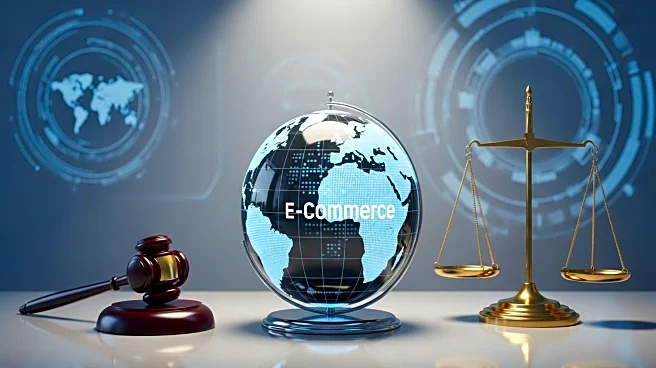What is the story about?
What's Happening?
The termination of the U.S. de minimis exemption, which previously allowed small-value imports to bypass tariffs and customs scrutiny, has led to significant disruptions in global supply chains. This change, accelerated by President Trump's executive order, has forced businesses to confront new compliance burdens and higher costs. The exemption's removal means that shipments under $800 are no longer duty-free, resulting in tariffs ranging from 10% for UK goods to 50% for items from Brazil and India. Small and medium enterprises (SMEs) are particularly affected, facing an estimated $71 billion in additional costs annually. These businesses must either pass these expenses to consumers or absorb them, leading to longer delivery times and higher prices. The shift has prompted companies to adapt to a more formalized customs process, with logistics firms expanding their customs compliance divisions to handle increased documentation requirements.
Why It's Important?
The end of the de minimis exemption is a significant regulatory change that impacts e-commerce and global trade. It poses challenges for SMEs, which are crucial to the U.S. economy, as they now face increased operational costs and compliance burdens. This development could lead to higher consumer prices and longer delivery times, affecting consumer behavior and market dynamics. However, it also presents opportunities for logistics firms and compliance technology startups that can navigate the new regime. Companies that prioritize nearshoring and domestic warehousing may benefit from reduced compliance costs and delivery delays, potentially reshaping retail operations and supply chain strategies. Investors may find opportunities in logistics firms with expertise in customs compliance and technology startups offering scalable solutions for tariff automation.
What's Next?
Businesses are likely to continue adapting to the new customs requirements, with a focus on nearshoring and domestic warehousing to mitigate cross-border tariffs. Logistics firms and compliance technology startups are expected to expand their operations to meet the demands of the post-de minimis world. This sector is projected to grow significantly, representing a compelling investment opportunity. Retailers that shift to localized supply chains may outperform in the long term, as they build more resilient and efficient systems. The broader implications for global trade and e-commerce will unfold as companies and investors adjust to the new regulatory landscape.
Beyond the Headlines
The termination of the de minimis exemption could lead to a long-term realignment of retail operations, favoring domestic manufacturers and logistics firms with the infrastructure to support localized supply chains. This shift may encourage innovation in compliance technology, as startups leverage AI to automate tariff calculations and streamline customs paperwork. The change also highlights the importance of strategic planning and adaptability in navigating regulatory shifts, with potential ethical and cultural implications for global trade practices.
















